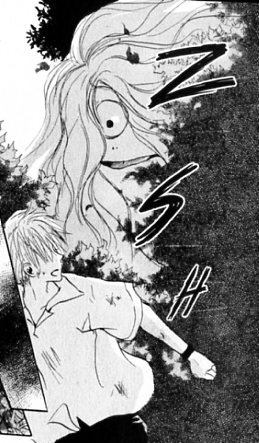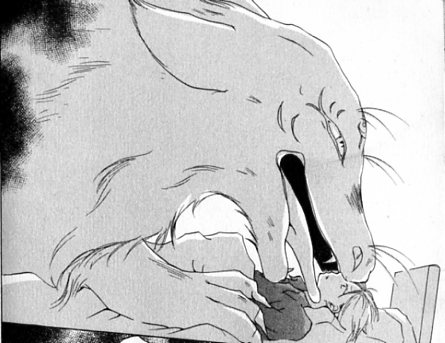This first ran in the Comics Journal.
_____________________
I haven’t read a ton of manga, but it seems lately that every one I do read involves someone who is able to see ghosts and spirits. Dokebi Bride; xxxholic, and now this. I have to say, it somewhat undercuts the pathos that Midorikawa wants me to feel. She keeps insisting that her main character, Natsume, has led a life of loneliness because he can see Yokai and no one else can. But, come on. Everyone can see them. They probably have endorsement deals. “Do you know me? I died and now roam the earth in disembodied agony. But I still get turned away at inns for some reason. That’s why I carry….”
It’s not hard to imagine these particular ghosts in advertisements, actually, because they, and the manga they inhabit, are so thematically generic. Dokebi Bride uses its ghosts as a metaphor for grief and loss; xxxholic uses its ghosts as a metaphor for karma. The first is one of the most beautiful comics narratives I’ve ever read; the second is not especially good, but at least has the virtue of being somewhat ruthless.
Book of Friends, though, is ghost story as after-school special. Natsume is gentle and kind and good, and also gentle and kind. He finds a book that allows him to control spirits, and instead of using it to control spirits he decides to seek out all the ghosts and free them, because he is pure of heart and has the blandness of ten. Presumably his niceness is supposed to be endearing, but its achieved with so little effort that it just makes him vague. His moony sad memories float by in the requisite shojo drifting-panels-of-white-space-with-petals-falling and you say to yourself, yep, there are those petals, I am supposed to feel sad now. But who can give a crap about this nonentity and his drearily unfocused self-pity? Occasionally a ghost threatens to eat him or pull his tongue out, and you almost wish one of them would do it just to see if that might infuse him with some spunk. I mean, hideous trauma — it gave Batman character, right? But alas; no one ever really hurts Natsume, and if they did, you’d figure he’d go along just the same, turning every encounter into a parable about the meaning of friendship. Awww…the poor ghost was sad, and I helped her, and now the world is just a little bit brighter. I am shojo Michael Landon!
Not that it’s all bad. Though, as I already mentioned, the art is largely by-the-numbers, the Yokai themselves look great. Based visually on ghosts and demons from Japanese prints, they’re all one-eyed with gaping maws, or horned and neckless, with weird skinny limbs that don’t bend quite right.
The inevitable cat familiar is lovely too — cute and majestic and ominous all at once.
Those two images are uncanny and weird; they use the distortion of scale to suggest Natsume’s powerlessness before a malleable world that he is prepared to casually devour him. If that was what the story was about, I’d want to keep following this series. But it isn’t, and I don’t.



I like this series a lot – though you’re right, it is a bit bland XD.
What I like about “Book of Friends” is that it begins with the premise that the world is hostile. Lots of times Natsume is told to be more careful, because the youkai who ask for his help all want something from him – maybe just a bit of him time, or to be friends, but sometimes to take the Book of Friends away or to eat him! But even knowing that, he helps them anyway, and 9 times out of 10 times the world is less hostile than he imagined.
I dunno, I just find this to be a really good message. It’s a good series to read when you are down, like Mushishi, which also hovers on the verge of being horror but then turns in a more gentle direction. Unlike, say, xxxHOLiC in which the worst possible outcome is *always* what happens…
I see Natume’s Book of Friends as being a YA/children’s story about reaching out even after you’ve been hurt. So I value it for that. I also really like that the grandmother was this horrible bully to the youkai, lol, but a total nonentity among humans.
Lots of things about the story, like Natsume’s passiveness and the fact that he often doesn’t seem to care whether or not he’ll be eaten, make sense if you figure he’s pretty deeply depressed. I actually like that facet of the character, his apathy combined with the flashes of spine he shows sometimes, when he draws boundaries and says “no sorry I’m tired today I can’t help you, come back tomorrow”. To be fair, this happens more often in the anime, XD.
I actually wrote this a while back, and barely remember the series. You do make it sound appealing; maybe I’ll give it another shot at some point.
I mean, all the things you said are true. Natsume is weirdly nice, the story does have a bland moral about being kind to others. It’s just those dark currents in it, like the cruel (but charismatic) grandmother, and the fact that Natsume’s cat familiar wants to eat him, that make those bland morals seem actually earned. Natsume is helping others, the way we all know we are supposed to, but it’s heroic for him, in particular, to be doing that. (Though he also does it because he doesn’t have anything to lose etc – though that gradually changes. It’s a slow and gentle story, it takes a long time to unfold.)
Hmm, someone who has closer to my opinion on this nearly universally praised manga.
If you also disliked the relative lack of horror, I would suggest Ima Ichigo’s Hyakki Yakoushou.
Yeah, I vaguely remember reviewing this manga and saying, huh it’s kind of boring. It was almost universally praised and lots and lots of people recommended it to me, and I was just sort of underwhelmed. I didn’t hate it or anything, but it’s just sort of there.
First of all, the proper title is Natsume’s Book of Friends (Natsume Yuujinchou in Japanese). Secondly, although it is admittedly a very slow-moving and episodic series it is one that I enjoy very much. If you go in expecting horror or action-adventure you are likely to be disappointed; it’s more slice-of-life about the strangeness of yokai and the few people who can see them.
Thirdly, “person whose primary character trait is being really nice” is a stock protagonist in shoujo; it usually takes the form of “girl who is otherwise rather ordinary but super-duper nice and thus makes lots of friends”, but there’s also an immense number of shoujo manga about people (usually very pretty young men) who have some sort of supernatural ability but whose real superpower, as it were, is being nice and good and kind and helpful towards others, even in highly stressful situations, which in turn causes people to be nice and helpful towards them, and who thus bring peace and happiness to all (Natsume’s Book of Friends, Silver Diamond, Hands Off!, The Betrayal Knows My Name, possibly Loveless at the more angst-ridden end of the scale… ). This might be in part because it’s aimed at a younger audience, but I think that Japanese pop culture in general and shoujo in particular just have a higher degree of appreciation for “niceness”.
Pingback: MangaBlog — Tomie on Twitter